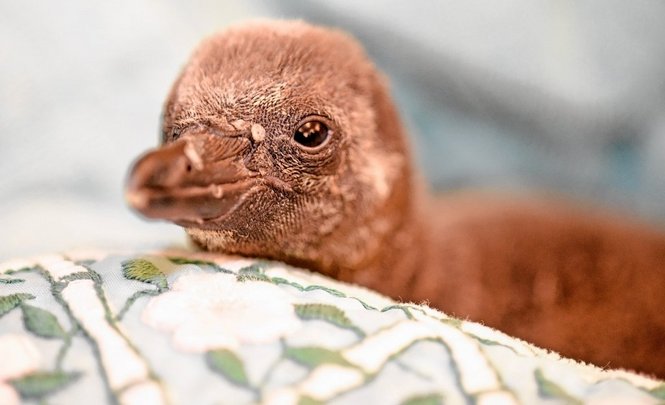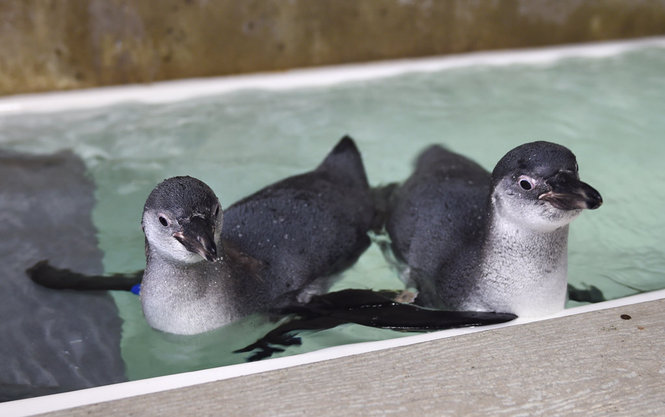Meet the penguin chicks of the Syracuse zoo Take a look behind the scenes at the Rosamond Gifford Zoo in Syracuse where six baby penguins are growing up and learning the ropes before joining the adults on exhibit. Video by Lauren Long | llong@syracuse.com
May 24, 2016
Finally, Phil (from Philly) and Carmen (from San Diego) inched into the public space – a $3.7 million home of carefully designed waterways, heated rocks and tunnels. The other 17 birds followed.
Over the next 11 years, the Rosamond Gifford Zoo in Syracuse would grow from the original colony of 19 birds to one of the most successful penguin breeding programs in the country.
48 chicks have hatched at the Syracuse zoo.
37 penguins remain in Syracuse. Others have moved to other zoos and aquariums under a careful species survival program that aims to pair the best birds for breeding across the country.
6 penguin chicks hatched this winter and spring in Syracuse.
Soon, the zoo will again open its doors for the new chicks to follow Phil and Carmen's brave footsteps into the colony.
In a series of videos, we will take you on this journey as the new chicks learn to swim, line up for meals and adjust to their environment.
In today's video story, you will meet the chicks:
Estrella hatched in December. Luis and Elmer were born in February. Luz hatched in March along with Salvador and his brother Otto.
Otto and "Sal" were hatched to parents Isa and Veinte. They raised Sal while Otto was fostered by Carmen and Phil – colony stalwarts still in Syracuse who have hatched four chicks and raised seven more from other parents.
The births of Otto and Sal mark an important moment for Syracuse. It is the first time for the zoo to have three generations in the same collection.
As they've grown, all six birds have been weaned from their parents and are undergoing a series of daily lessons from their human keepers.
When they hatched, the chicks ranged in weight from 66 to 80 grams (or 2.3 to 2.8 ounces.)
Now, they range from 6 to almost 9 pounds.
They have shed their fuzzy baby feathers and grown waterproof ones. They are developing voices, displays and other behaviors – unique personalities that seem surprising for birds that are hard to differentiate in their matching black and white tuxedos.
The penguins' health is closely monitored by keepers, who count each fish they eat and measure their weight. The penguins are even learning how to hop on a scale one-by-one before waddling into another room for swim lessons.
Otto, named by the community during the SU basketball teams' run up the Final Four, is a little shy. Elmer, named because his cracked shell was glued back together, likes to be close to the keepers.
Luis has an independent streak. He's a great swimmer, holding his breath and diving on just the second swim lesson.
Check Syracuse.com for updates on their progress.
Some facts:
Warm-weather penguins: The penguins in Syracuse are Humboldt penguins, named for the Humboldt current that flows from the Central Pacific. They are a subtropical species that is endangered in Peru and Chile. There are an estimated 40,000 Humboldt penguins in the wild.
Cold-weather home: Syracuse is known for its cold climate, but the birds are on display in the outdoor exhibit all year. They nest in heated rocks and swim in water kept to about 50 degrees in winter and 60 degrees in the summer. They have a warm, indoor holding area to hang out in weather below 20 degrees.
Loyalty: Penguins usually mate for life, although they are known have affairs. Pairs can foster chicks hatched by other pairs.
Sharing the work: Both male and female penguins sit on the eggs and take turns fetching food for the chicks.
Chicks: Eggs incubate about 40 days. Chicks fledge at about 10 to 12 weeks.
Life span: They can live up to 30 years in captivity.
source









No comments:
Post a Comment